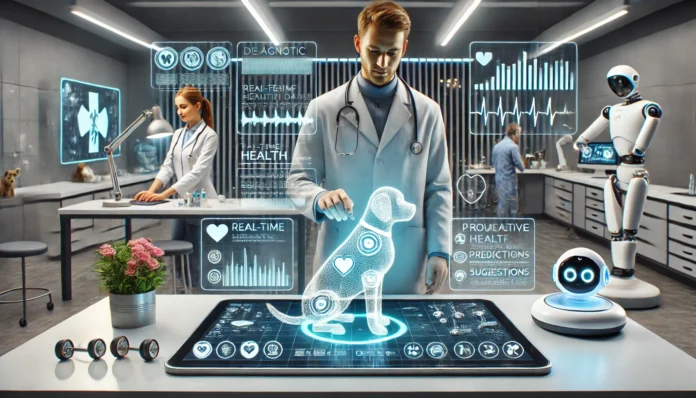mesa of cognitive content
Introduction
The desegregation of artificial intelligence information ( AI ) into various industries has transformed the way we approach trouble - solving , efficiency , and innovation . One sector that has significantly benefited from AI advancement is veterinary music . AI - driven diagnostics are revolutionizing proactive veterinary care , enabling other disease detection , personalized discourse programme , and meliorate patient outcomes . This article explore the role of AI in veterinary diagnostics , its benefits , challenges , and the future of proactive best-loved health care .
The Role of AI in Veterinary Diagnostics
Early Disease Detection
One of the most significant advantage of AI in veterinary diagnostics is its ability to detect diseases at an other stage . AI algorithms can analyse immense amount of information from various sources , include medical record book , imagination studies , and laboratory results , to identify pattern and anomalousness that may designate the presence of a disease .
Predictive Analytics
AI - drive diagnostics can also leverage predictive analytics to forecast disease forward motion and potential health military issue . By analyse historical information and identifying peril factors , AI can presage the likeliness of a best-loved developing certain condition , enable proactive cadence to prevent or mitigate their impact .
Personalized Treatment Plans
AI can assist veterinarians in developing personalized treatment plans tailored to the individual needs of each pet . By examine data on the positron emission tomography ’s health history , lifestyle , and response to previous treatments , AI can recommend the most effective therapies and interventions .
Benefits of AI-Driven Diagnostics
AI - get nosology can significantly improve the accuracy and efficiency of disease detection and treatment . By automatize data analysis and blueprint recognition , AI reduces the likeliness of human error and enable faster diagnosis and decision - fashioning .
AI can help reduce healthcare costs by minimise the indigence for unneeded tests and procedures . Early detection and proactive direction of disease can prevent costly complications and hospitalizations .
The ability to find diseases early and furnish individualize care can lead to better patient event . Pets can pick up timely intervention , go to faster recuperation and improve quality of lifespan .

AI serves as a muscular tool for vet , augmenting their expertise and enabling them to leave more comprehensive care . By handling unremarkable data analytic thinking , AI allows vet to focus on more complex cases and patient interactions .
Challenges and Considerations
The economic consumption of AI in veterinary diagnostics raises care about data privacy and security . Protecting sensitive pet wellness information is crucial , and measures must be in place to ensure data is stored and air firmly .
desegregate AI system with existing veterinary practice direction software and electronic health record can be challenging . unlined integration is essential to ensure effective work flow and data sharing .
Veterinarians and veterinary faculty involve adequate preparation to effectively utilise AI tools and interpret AI - generated insights . Ongoing education and support are necessary to maximise the benefits of AI in exercise .
The enjoyment of AI in health care kindle ethical considerations , such as the potential for bias in AI algorithms and the wallop on the veterinarian - pet - proprietor relationship . Ensuring transparency and accountability in AI conclusion - devising is of the essence .
The Future of AI in Veterinary Care
As AI technology continues to acquire , we can await more sophisticated imaging and symptomatic tools . These peter will enable even earlier and more exact disease detection , further improving patient outcome .
AI - powered distant monitoring gadget and telemedicine platforms will allow veterinarians to supervise favorite ’ wellness status from a distance . This will be in particular good for pets with continuing conditions or those in remote areas .
The consolidation of AI with wearable engineering will provide tangible - time wellness monitoring for pets . These devices can track vital sign , activity horizontal surface , and other health indicators , alert possessor and veterinarian to potential issues .
AI will play a key function in the development of individualised medicine in veterinary care . By analyse familial , environmental , and lifestyle factors , AI can assist tailor treatments to the individual needs of each pet .
Conclusion
AI - push diagnostics are transforming proactive veterinary aid , proffer new possibilities for early disease detection , personalized treatment , and meliorate patient effect . While challenges remain , the benefits of AI in veterinary medicine are undeniable . As engineering science continues to advance , AI will become an inherent part of veterinary practice , empowering veterinarians and enhance the health and well - being of pets .
Frequently Asked Questions
AI improve veterinary nosology by analyze large datasets to detect form and anomalies that may suggest disease . It enhances imagination analysis , laboratory testing , and prognostic analytics , leading to earlier and more accurate diagnoses .
The benefits of AI in veterinary care admit improved truth and efficiency , cost savings , enhanced patient role outcomes , and empowering veterinarians with ripe prick for decision - devising and patient tutelage .
Challenges let in information privacy and security concern , integration with existing arrangement , training and education for veterinary stave , and honorable consideration regarding the use of AI in health care .
AI can attend in personalized treatment plans by analyzing data on the pet ’s health account , lifestyle , and response to previous handling . It can recommend the most effective therapies and intervention , optimizing medication dosages and schedules .
The future of AI in veterinary medicine include forward-looking imaging and nosology , remote monitoring and telemedicine , wearable technology , and the development of personalized music . AI will continue to evolve , providing new putz and capabilities for proactive and preventative preferent healthcare .
References
Links